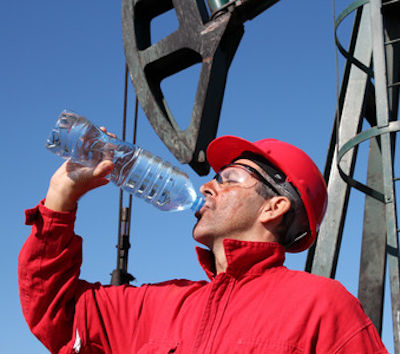Other Risk Factors
Make sure you take extra care if you have any additional risk factors:
- diabetes, heart disease, obesity, pregnancy, any acute viral illness
- lack of recent exposure to heat

Be sure to get adequate water and minerals. Don't drink distilled water.
- some medications (including antihistamines, diuretics, some other medications - ask your health care provider or pharmacist)
- worker fatigue
- drugs, especially cocaine and amphetamines
Fluid Intake
- Drink plenty of cool water - drink before you are thirsty. Sports drinks are a good idea because they help to replace electrolytes. Distilled water has no electrolytes and should be avoided. When you sweat, you lose minerals as well as water, and your body requires those minerals to work properly.
- Drink small amounts often - a 6-ounce cup every 20 minutes, more depending on work load and heat.
- BUT - don't drink more than a quart (32 ounces) in an hour (you can also get sick from too much water). In general, don't drink more than 12 quarts a day.
- Eat a normal diet. Frequent small meals are best. Sports drinks contain salts (which you lose as you sweat), so if you're not able to eat regularly, they are a good alternative.
- Avoid alcohol or caffeinated drinks.
Urine Output Color
Urine color can indicate hydration levels. Here’s a guide:
- Clear or Pale Yellow: Indicates proper hydration.
- Light Yellow to Amber: Suggests mild dehydration; increase fluid intake.
- Dark Yellow or Honey-colored: Signals moderate dehydration; drink water soon.
- Orange or Darker: May indicate severe dehydration or other health issues. Seek hydration immediately and consider medical attention if it persists.
Note: Bright or unusual urine colors (e.g., red, blue, or cloudy) might be caused by diet, medication, or potential health concerns. If unexplained, consult a healthcare professional.
Knowledge Check Choose the best answer for the question.
6-6. Why should oil spill cleanup workers avoid drinking distilled water, especially when it's hot?
You forgot to answer the question!

